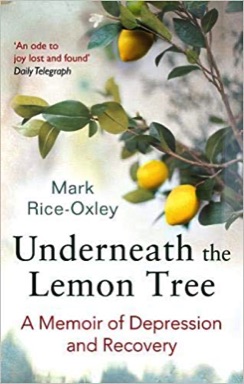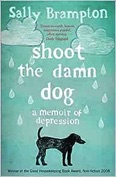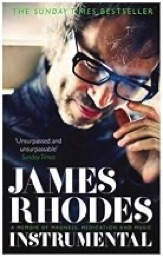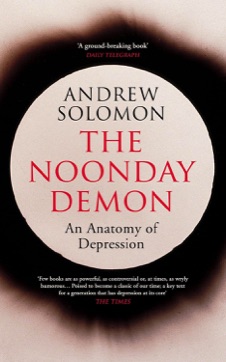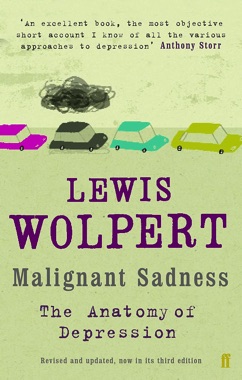Books about mental illness
Adam, D. (2014). The man who couldn’t stop: OCD, and the true story of a life lost in though.
Publisher’s / Amazon summary: “Have you ever had a strange urge to jump from a tall building, or steer your car into oncoming traffic? You are not alone. In this captivating fusion of science, history and personal memoir, writer David Adam explores the weird thoughts that exist within every mind, and how they drive millions of us towards obsessions and compulsions. 'One of the best and most readable studies of a mental illness to have emerged in recent years . . . an honest and open and, yes, maybe life-changing work' – Matt Haig, Observer Told with fierce clarity, humour and urgent lyricism, this extraordinary book is both the haunting story of a personal nightmare, and a fascinating doorway into the darkest corners of our minds. David has suffered from obsessive compulsive disorder (OCD) for twenty years, and The Man Who Couldn't Stop is his unflinchingly honest attempt to understand the condition and his experiences. What might lead an Ethiopian schoolgirl to eat a wall of her house, piece by piece; or a pair of brothers to die beneath an avalanche of household junk that they had compulsively hoarded? At what point does a harmless idea, a snowflake in a clear summer sky, become a blinding blizzard of unwanted thoughts? Drawing on the latest research on the brain, as well as historical accounts of patients and their treatments, this is a book that will challenge the way you think about what is normal, and what is mental illness."
My comments: To review.
Bell, J. (2007). Rewind, replay, repeat: A memoir of obsessive-compulsive disorder.
Publisher’s / Amazon summary: “Rewind, Replay, Repeat is the revealing story of Jeff Bell's struggle with obsessive-compulsive disorder (OCD) and his hard-won recovery. Nagging doubt: It's a part of everyday life. Who hasn't doubled back to check on a door or appliance? But what if one check wasn't enough? Nor two or three? And what if nagging doubt grew so intense that physical senses became all but useless? Such was the case for Bell, a husband, father, and highly successful radio news anchor--and one of the millions of Americans living with obsessive-compulsive disorder (OCD). His fascinating memoir recounts the depths to which this debilitating anxiety disorder reduced him--to driving his car in continuous circles, scouring his hands in scalding water, and endlessly rewinding, replaying, and repeating in his head even the most mundane daily experiences. Readers will learn what OCD feels like from the inside, and how healing from such a devastating condition is possible through therapy, determination, and the support of loved ones."
My comments: To read.
Bentall, R.P. (2009). Doctoring the mind: Why psychiatric treatments fail.
Publisher’s / Amazon summary: “Towards the end of the twentieth century, the solution to mental illness seemed to be found. It lay in biological solutions, focusing on mental illness as a problem of the brain, to be managed or improved through drugs. We entered the 'Prozac Age' and believed we had moved on definitively from the time of frontal lobotomies to an age of good and successful mental healthcare. Biological psychiatry had triumphed.
Except maybe it hadn't. Starting with surprising evidence from the World Health Organisation that suggests people recover better from mental illness in a developing country than in the first world, Doctoring the Mind asks the question: how good are our mental health services, really? Richard Bentall picks apart the science that underlies current psychiatric practice across the US and UK. Arguing passionately for a future of mental health treatment that focuses as much on patients as individuals as on the brain itself, this is a book set to redefine our understanding of the treatment of madness in the twenty-first century..
My comments: To read.
Bentall, R.P. (2003). Madness explained: Psychosis and human nature.
Publisher’s / Amazon summary: “In Madness Explained, leading clinical psychologist Richard Bentall shatters the modern myths that surround psychosis. Is madness purely a medical condition that can be treated with drugs? Is there a clear dividing line between who is sane and who is insane? For this revised edition, he adds new material drawing on the recent advances in molecular genetics, new studies of the role of environment in psychosis, and important discoveries on early symptoms preceding illness, among other important developments in our understanding. ‘Madness Explained is a substantial, yet highly accessible work. Full of insight and humanity, it deserves a wide readership.' Sunday Times 'Will give readers a glimpse both of answers to their own problems, and to questions about how the mind works' Independent Magazine”.
My comments: To read.
Brampton, S. (2011). Shoot the damn dog.
Publisher’s / Amazon summary: “Shoot the Damn Dog blasts the stigma of depression as a character flaw and confronts the illness Winston Churchill called 'the black dog', a condition that humiliates, punishes and isolates its sufferers. It is a personal account of a journey through (and out of) severe depression, as well as being a practical book, offering ideas about what might help. With its raw, understated eloquence, it will speak volumes to anyone whose life has been haunted by depression, as well as offering help and understanding to those whose loved ones suffer from this terrifying condition."
My comments: I felt optimistic when I came to the end of this book. Sally Brampton killed herself by walking into the sea in May 2016.
Burns, D.D. (1999). The feeling good handbook.
Publisher’s / Amazon summary: “If you are looking for sound, workable advice on how to change your life a little or a lot, this is the book for you ― Robert L. Leahy, Ph.D., Director, Centre for Cognitive Therapy, New York. Dr Burns has done it again. He had provided us with clearly described and practical guidelines for dealing with fears, anxieties, panic attacks, procrastination, and communication problems ... invaluable ― M. Anthony Bates, Ph.D., Clinical Psychologist, Dublin Ireland. Carries the very useful procedures of Feeling Good into many other important areas of life. Clear, systematic, and forceful. ― Albert Ellis, Ph.D., President, Institute for Rational-Emotional Therapy and author of A New Guide to Rational Living. This book makes a difference. Anyone who experiences emotional distress (that is, everyone) will find this book invaluable. Dr. Burns presents dozens of helpful exercises in his inimitable, lively, and self-revealing style. ― Jackie Persons, Ph.D., Associate Clinical Professor, Department of Psychiatry, University of California at San Francisco, and Director, San Francisco Bay Area Centre for Cognitive Therapy.
My comments: This book was recommended to be, but it is still yet “to read”.
Cartwright, R. (2016). Pure.
Publisher’s / Amazon summary: "Rose Cartwright has OCD, but not as you know it. Pure is the true story of her ten-year struggle with Pure O, a little-known form of the condition, which causes her to experience intrusive sexual thoughts of shocking intensity. It is a brave and frequently hilarious account of a woman who refused to give up, despite being undermined at every turn by her obsessions and enduring years of misdiagnosis and failed therapies. Eventually, the love of family and friends, and Rose's own courage and sense of humour prevailed, inspiring this deeply felt and beautifully written memoir. At its core is a lesson for all of us: when it comes to being happy with who we are, there are no neat conclusions."
My comments: It's very chatty in style, but I don't think it's aimed at me. "Rose" is obsessed by sex, and has obsessional thought without compulsions - hence "Pure O". I don't think pure obsessional thinking is that rare, although it is perhaps less commonly talked about than compulsive behaviours (such as washing your hands multiple times. I assume OCD lies on a continuum from "Pure O" to "Pure C", with most people somewhere in between. This book is very much a story, and I must admit I didn't learn much about pure obsessional thinking. I would have liked to have seen more of the clinical history explored too, and there is nothing about the pathology of obsessional thinking and why it occurs. As described in my book, when a teenager I had three compulsions: to get up from bed during the night and check that the front door was shut; getting up to check my wallet was in my jacket pocket; and washing my hands (but to a lesser extent). Now I have very few compulsions, and none that bother me, but I am very prone to obsessional thinking. The content varies, and it's most unpleasant. Obsessions were there when I was young too, one example being having to say sorry mentally in multiples of three. Looking back I can see that the seeds of obsessional thinking were present even younger in childhood. Rose also clearly worries that her obsessions mean something: that they have some content. I worry less about that than the fact that I have them at all, and can't do anything about them. It resonates with my thinking on consciousness and mental causation in that we are not really in control of what we think, but what we think is in control of us. I have the impression that OCD is more fixed in its occurrence. Depression can be summed up as occurring because of an interaction between genes and environment: you need a trigger to become depressed, although the severity of that trigger will differ between people. I'm not sure you can escape OCD if you have the genes. What happened to my childhood obsessions and compulsions? They just faded away. Am I better now? Yes. Am I well? Sadly, no.
Davis, L. (2008). Obsession: A history.
Publisher’s / Amazon summary: “We live in an age of obsession. Not only are we hopelessly devoted to our work, strangely addicted to our favourite television shows, and desperately impassioned about our cars, we admire obsession in others: we demand that lovers be infatuated with one another in films, we respond to the passion of single-minded musicians, we cheer on driven athletes. To be obsessive is to be American; to be obsessive is to be modern.”
My comments: To read.
Fallon, J. (2013). The psychopath inside: A neuroscientist’s personal journey into the dark side of the brain.
Publisher’s / Amazon summary: “For his first 58 years, James Fallon was by all appearances a normal man. A successful neuroscientist and professor, he had been raised in a loving family, married his school sweetheart and had three kids and lots of friends. Then he learned a shocking truth that would not only disrupt his personal and professional life, but would lead him to question the very nature of his own identity. While researching serial killers, he uncovered a pattern in their brain scans that helped explain their cold and violent behaviour. Astonishingly, his own scan matched that pattern. And a few months later he learned that he was descended from a long line of murderers. Fallon set out to reconcile the truth about his own brain with everything he knew as a scientist about the mind, behaviour and personality.”
My comments: To read. Not about depression or anxiety, but by all accounts a fascinating insight into another branch of psychopathology (although perhaps in this case it should be called something like “normal psychopathology”), psychopathy.
Hacking, I. (1998). Mad travellers: Reflections on the reality of transient mental illness.
Publisher’s / Amazon summary: “Ian Hacking tells the fascinating tale of Albert Dadas, a native of France’s Bordeaux region and the first diagnosed mad traveler. Dadas suffered from a strange compulsion that led him to travel obsessively, often without identification, not knowing who he was or why he traveled. Using the records of Philippe Tissié, Dadas’s physician, Hacking attempts to make sense of this strange epidemic. In telling this tale, Hacking raises probing questions about the nature of mental disorders, the cultural repercussions of their diagnosis, and the relevance of this century-old case study for today’s overanalyzed society.”
My comments: To read.
Higashida, N. (2007). The reason I jump.
Publisher’s / Amazon summary: “The No. 1 Sunday Times and internationally bestselling account of life as a child with autism, now a documentary film Winner of Best Documentary and Best Sound in the British Independent Film Awards 2021. 'It will stretch your vision of what it is to be human' Andrew Solomon, The Times. What is it like to have autism? How can we know what a person - especially a child - with autism is thinking and feeling? This groundbreaking book, written by Naoki Higashida when he was only thirteen, provides some answers. Severely autistic and non-verbal, Naoki learnt to communicate by using a 'cardboard keyboard' - and what he has to say gives a rare insight into an autistically-wired mind. He explains behaviour he's aware can be baffling such as why he likes to jump and why some people with autism dislike being touched; he describes how he perceives and navigates the world, sharing his thoughts and feelings about time, life, beauty and nature; and he offers an unforgettable short story. Proving that people with autism do not lack imagination, humour or empathy, THE REASON I JUMP made a major impact on its publication in English. Widely praised, it was an immediate No. 1 Sunday Times bestseller as well as a New York Times bestseller and has since been published in over thirty languages. In 2020, a documentary film based on the book received its world premiere at the Sundance Film Festival. Directed by Jerry Rothwell, produced by Jeremy Dear, Stevie Lee and Al Morrow, and funded by Vulcan Productions and the British Film Institute, it won the festival's Audience Award for World Cinema Documentary, then further awards at the Vancouver, Denver and Valladolid International Film Festivals before its global release in 2021. The book includes eleven original illustrations inspired by Naoki's words, by the artistic duo Kai and Sunny.”
My comments: Translated from Japanese. To read.
Horwitz, A.V., & Wakefield, J.C. (2012). The loss of sadness.
Publisher’s / Amazon summary: “Depression has become the single most commonly treated mental disorder, amid claims that one out of ten Americans suffer from this disorder every year and 25% succumb at some point in their lives. Warnings that depressive disorder is a leading cause of worldwide disability have been accompanied by a massive upsurge in the consumption of antidepressant medication, widespread screening for depression in clinics and schools, and a push to diagnose depression early, on the basis of just a few symptoms, in order to prevent more severe conditions from developing.”
My comments: To read.
Jamison, K.R. (1999). Night falls fast: Understanding suicide.
Publisher’s / Amazon summary: “A beautifully written, heartfelt response to the untolled epidemic of suicide.”
My comments: To read.
Johnstone, M. (2005). I had a black dog.
Publisher’s / Amazon summary: “'I Had a Black Dog says with wit, insight, economy and complete understanding what other books take 300 pages to say. Brilliant and indispensable.' - Stephen Fry. ’Finally, a book about depression that isn't a prescriptive self-help manual. Johnston's deftly expresses how lonely and isolating depression can be for sufferers. Poignant and humorous in equal measure.' Sunday Times. There are many different breeds of Black Dog affecting millions of people from all walks of life. The Black Dog is an equal opportunity mongrel. It was Winston Churchill who popularized the phrase Black Dog to describe the bouts of depression he experienced for much of his life. Matthew Johnstone, a sufferer himself, has written and illustrated this moving and uplifting insight into what it is like to have a Black Dog as a companion and how he learned to tame it and bring it to heel.”
My comments: A very popular graphic/comic guide to depression. Not for me, but the online reviews suggest it has helped many people.
Kelly, R. (2014). Black rainbow: How words healed me - my journey through depression.
Publisher’s / Amazon summary: “Black Rainbow is the powerful first-person story of one woman's struggle with depression and how she managed to recover from it through the power of poetry. In 1997, Oxford graduate, working mother and Times journalist Rachel Kelly went from feeling mildly anxious to being completely unable to function within the space of just three days. Prescribed antidepressants by her doctor, and supported by her husband and her family, Rachel slowly began to get better, but her anxiety levels remained high, and six years later, as a stay-at-home mother, she suffered a second collapse even worse than the first. Throughout both of Rachel's periods of severe depression, the healing power of poetry became an integral part of her recovery. As someone who had always loved poetry, it became something for Rachel to cling on to in times of need - from repeating short mantras to learning and reciting entire poems - these words and verses became a powerful force for change in her life. In Black Rainbow Rachel analyses why poetry can be one answer to depression, and the book contains a selected 40 of the poems that provided Rachel with solace and comfort during her breakdown and recovery. At a time when mental health problems and depression are becoming more common, and the stigma around such issues is finally being lifted, this book offers a lifeline for anyone seeking to understand depression and seek new ways to treat it. Poetry is free, has no side-effects and, as Rachel can attest, 'prescribing words instead of pills' can be an incredibly powerful remedy.”
My comments: To read.
Kramer, P.D. (1994). Listening to Prozac.
Publisher’s / Amazon summary: “The landmark book about antidepressants and the remaking of the self”.
My comments: To read, although in spite of there being revised editions it is getting on a bit. It is a landmark book; so how come I never got round to reading it?
Kristen, J. (1987). Black sun.
Publisher’s / Amazon summary: “In Black Sun, Julia Kristeva addresses the subject of melancholia, examining this phenomenon in the context of art, literature, philosophy, the history of religion and culture, as well as psychoanalysis. She describes the depressive as one who perceives the sense of self as a crucial pursuit and a nearly unattainable goal and explains how the love of a lost identity of attachment lies at the very core of depression's dark heart.
In her discussion she analyzes Holbein's controversial 1522 painting "The Body of the Dead Christ in the Tomb," and has revealing comments on the works of Marguerite Duras, Dostoyevsky and Nerval. Black Sun takes the view that depression is a discourse with a language to be learned, rather than strictly a pathology to be treated."
My comments: To read.
LeDoux, J. (2105). Anxious.
Publisher’s / Amazon summary: “Anxiety is the most prevalent psychiatric problem of our time. Decades of research have gone into probing its mysteries and developing treatments. But what if we’ve been thinking about fear and anxiety in the wrong way for all these years? This is the groundbreaking premise behind a wave of new research, led by the lab of renowned neuroscientist Joseph LeDoux. He believes that fear and anxiety are not innate states, simply waiting to be unleashed in the brain. Rather they are assembled experiences, and that has huge implications for patients. By mapping brain circuits, LeDoux explains the origins of anxiety disorders and reveals discoveries that can restore sufferers to normality. As impressive as it is timely, Anxious is a comprehensive survey of cutting-edge research revolutionising the way we treat our most pressing mental health issue.”
My comments: To read. I am a fan of LeDoux’s work, and I have every confidence that it will prove excellent.
Lewis, G. (2002). Sunbathing in the rain: A cheerful book about depression.
Publisher’s / Amazon summary: “01 Ways to Climb out of the Slough of Despondency – a literary guide (part memoir, part companion) to coming through depression. 'Depression is internal snow. Black snow. The flakes whirl around like motes in the water around your personal shipwreck. The quicker you dive down to see your sorry state, the better for you in life. For above you, if only you can reach it without getting the bends, are sunshine, laughter on a yacht, the clink of plates as a lunch of steaming fish is handed round.’ Whilst the overall structure of ‘Sunbathing in the Rain’ moves from dark to light, telling the story of Lewis's recovery, its different strands allow a variety of tones and subjects to be explored, from the profound to the frivolous. Alongside a paragraph about the proper relationship between the ego, the mind and the emotions nestles a passage on the therapeutic value of nail varnish. Practical hints on how to get better (diet, read Hello!, helpful pieces of music) are alongside striking quotations, ranging from sentences on crisp packets, to prayers, from Russian orthodox writings on silence to collections of slang. Part memoir – drawing on her own experiences, both adverse and encouraging, as a depressive and an alcoholic – and part guide or companion, this book brings Burton's ‘Anatomy of Melancholy’ into the twenty-first century. For it will have two voices, one calling from the valley of despair, the other from a safer, calmer new place. The suffering depressive needs help from outside his or her own consciousness, a radical new perspective that makes life possible again. This unique book offers it.
My comments: To read.
Limbourg, J. (2010). The woman who thought too much: A memoir of obsession and compulsion.
Publisher’s / Amazon summary: “Joanne Limburg thinks things she doesn't want to think, and does things she doesn't want to do. As a young woman, obsessive thoughts and compulsive behaviours had come to completely dominate her life. She knew that something was wrong, but it would take many painful years of searching to find someone who could explain her symptoms.
The Woman Who Thought Too Much is a vividly honest, beautifully told and darkly witty memoir about the quest to understand and manage a life with Obsessive-Compulsive Disorder.”
My comments: To read.
Manning, M. (1994). Undercurrents: A life beneath the surface.
Publisher’s / Amazon summary: “A brilliant combination of wit, irony, and despair...."Undercurrents "is absolutely as good as it gets."-"Los Angeles Times""Full of unexpected delights...honest, hilarious, full of hope."-"Dallas Morning News""Humor, candor, and a respect for the power of image and metaphor to heal."-"Philadelphia Inquirer""A moving and engaging journal....I found myself laughing out loud."-"Washington Post""A convincing testament to the inexorable cruelty of depression and a frightening reminder of its unprejudiced choice of victims."-"New York Times Book Review""An absolutely absorbing read."-"USA Today"
My comments: To read.
Marchant, J. (2016). Cure: A journey into the science of mind over body.
Publisher’s / Amazon summary: “All in the mind? -Can meditation fend off dementia? Can the smell of lavender affect the immune system? Can your thoughts ease physical pain? In Cure, award-winning science writer Jo Marchant travels the world to meet the physicians, patients and researchers on the cutting edge of mind-body medicine. Asking how the brain can heal the body and how we can all make changes to keep ourselves healthier.”
My comments: To read.
Moncrieff, J. (2013). The bitterest pills: The troubling stories of antipsychotic drugs.
Publisher’s / Amazon summary: “A challenging reappraisal of the history of antipsychotics, revealing how they were transformed from neurological poisons into magical cures, their benefits exaggerated and their toxic effects minimized or ignored.”
My comments: To read.
Power, M. (2015). Madness cracked.
Publisher’s / Amazon summary: “The recent publication of a new edition of the American Diagnostic and Statistical manual (DSM-5) highlighted the two contrary viewpoints that exist within the field of mental health. There are those who value such classification systems, seeing each revision of the DSM as a fine-tuning exercise, and there are those who are strongly opposed, seeing such exercises as fundamentally flawed. 'Madness Cracked' provides a fascinating introduction to the history of psychiatry and clinical psychology, looking at how these areas have attempted to classify the various problems and disorders that their practitioners have faced in everyday use. Within the book, Power argues that - like in other areas of science - progress can only be made if the classification systems that are used have a sound theoretical basis. In addition, he outlines a model derived from work on cognition and emotion showing how, with appropriate modifications, it could provide a theoretical basis for classification and diagnosis. Using extraordinary examples from the history of psychiatry and clinical psychology, along with fascinating case material, he shows how our current knowledge in psychology can be developed to provide the theoretical basis that the field needs. For anyone in the field of mental health, Madness Cracked is a thought-provoking and controversial new book.'.”
My comments: To read.
Rhodes, J. (2015). Instrumental: A memoir of madness, medication and music.
Publisher’s / Amazon summary: “James Rhodes' passion for music has been his absolute lifeline. It has been the thread that has held him together through a life that has encompassed pain, conflict and turmoil. Listening to Rachmaninov on a loop as a traumatised teenager or discovering an Adagio by Bach while in a hospital ward – such exquisite miracles of musical genius have helped him survive his demons, and, along with a chance encounter with a stranger, inspired him to become the renowned concert pianist he is today.”
My comments: I read this when it first came out, and I can only say that I remember thinking it was very good.
Rice-Oxley, M. (2012). Underneath the lemon tree.
Publisher’s / Amazon summary: "How many men do you know who have been through periods when their lives haven't seemed right? How badly askew were things for them? Many men suffer from depression yet it is still a subject that is taboo. Men often don't visit the doctor, or they don't want to face up to feelings of weakness and vulnerability. By telling his story, Mark Rice-Oxley hopes it will enable others to tell theirs. In this intensely moving memoir he retraces the months of his utmost despair, revisiting a landscape from which at times he felt he would never escape. Written with lyricism and poignancy, Mark captures the visceral nature of this most debilitating of illnesses with a frightening clarity, while at the same time offering a sympathetic and dispassionate view of what is happening, and perhaps why. This is not a self-help book but a memoir that is brimful of experience, understanding and hope for all those who read it. It is above all honest, touching and surprisingly optimistic."
My comments: Of all the books I've read about depression, this one comes closes to describing my own experience. It's extremely well written and captures the hope and hopelessness perfectly. I recommend it very highly. The book also traces recovery. Mark Rice-Oxley's experience is similar to mine, over many cycles of depression, in that one day you notice you're starting to feel a bit better. It isn't like a switch being flipped, and it isn't a smooth path to recovery, As it's happened to me many times now I have learned that when I am at my worst, I just have to remember that implausible though it might seem, over time I will feel better.
Shorter, E. (2013). How everyone became depressed: The rise and fall of the nervous breakdown.
Publisher’s / Amazon summary: "This book argues that psychiatry's love affair with the diagnosis of depression has become a death grip. Depression is a real illness, especially in its melancholic form. But most patients who get the diagnosis of 'depression' are also anxious, fatigued, unable to sleep, have all kinds of physical symptoms, and tend to obsess about the whole thing. They do not have a disorder of 'mood'. It is a travesty to call them all 'depressed.' How did this happen? How did everyone become depressed? A well-known historian, the author describes how in the 19th century patients with those symptoms were considered 'nervous,' and when they lost control it was a 'nervous breakdown.' Then psychiatry turned its back on the whole concept of nerves, and - first under the influence of Freud's psychoanalysis and then the influence of the pharmaceutical industry - the diagnosis of depression took center stage. The result has been a scientific disaster, leading to the misdiagnosis and inappropriate treatment (with antidepressants) of millions of patients. Urging that the diagnosis of depression be re-thought, the book turns a dramatic page in the understanding of psychiatric symptoms that are as common as the common cold. The book makes an immediate contribution to the debate about DSM5, which is due to be released very soon, in terms of discussing the diagnosis of depression. The author controversially proposes replacing the diagnosis of 'major depression' with 'melancholia' and 'nonmelancholia'; he argues that depression and anxiety usually occur together and are really the same disease; and he says that patients with so-called mood disorders really have a disorder of the entire body. The author's ability to make use of the enormous well of psychiatry's past history in several languages make this a unique book that contributes to the important discussions today of diagnosis and treatment.
My comments: To read.
Solomon, A. (2002). The noonday demon.
Publisher’s / Amazon summary: "Like Primo Levi's The Periodic Table, The Noonday Demon digs deep into personal history, as Andrew Solomon narrates, brilliantly and terrifyingly, his own agonising experience of depression. Solomon also portrays the pain of others, in different cultures and societies whose lives have been shattered by depression and uncovers the historical, social, biological, chemical and medical implications of this crippling disease. He takes us through the halls of mental hospitals where some of his subjects have been imprisoned for decades; into the research labs; to the burdened and afflicted poor, rural and urban. He talks to faith healers and voyages around the world in a quest for folk wisdom. He analyses the medications of today as well as reviewing the politics of diagnosis and treatment and, perhaps most significantly, he looks at the vital role of will and love in the process of recovery. **ONE OF THE GUARDIAN'S 100 BEST BOOKS OF THE 21st CENTURY**”
My comments: Read in 2016. A classic I enjoyed, if that’s the right word. To re-read.
Tallis, F. (1990). How to stop worrying.
Publisher’s / Amazon summary: "FA guide to making worry work for you, helping you to avoid stress and anxiety. The author sets out to teach how to understand fear and face the possibilities of life calmly.”
My comments: To read.
Welch, G., Schwartzl, L.M., & Woloshin, S. (2011). Overdiagnosed: Making people sick. in the pursuit of health.
Publisher’s / Amazon summary: "From a nationally recognized expert, an exposé of the worst excesses of our zeal for medical testing. Going against the conventional wisdom reinforced by the medical establishment and Big Pharma that more screening is the best preventative medicine, Dr. Gilbert Welch builds a compelling counterargument that what we need are fewer, not more, diagnoses. Documenting the excesses of American medical practice that labels far too many of us as sick, Welch examines the social, ethical, and economic ramifications of a health-care system that unnecessarily diagnoses and treats patients, most of whom will not benefit from treatment, might be harmed by it, and would arguably be better off without screening. Drawing on twenty-five years of medical practice and research on the effects of medical testing, Welch explains in a straightforward, jargon-free style how the cutoffs for treating a person with "abnormal" test results have been drastically lowered just when technological advances have allowed us to see more and more "abnormalities," many of which will pose fewer health complications than the procedures that ostensibly cure them. Citing studies that show that 10 percent of two thousand healthy people were found to have had silent strokes, and that well over half of men over age sixty have traces of prostate cancer but no impairment, Welch reveals over-diagnosis to be rampant for numerous conditions and diseases, including diabetes, high cholesterol, osteoporosis, gallstones, abdominal aortic aneurysms, blood clots, as well as skin, prostate, breast, and lung cancers. With genetic and prenatal screening now common, patients are being diagnosed not with disease but with "pre-disease" or for being at "high risk" of developing disease. Revealing the economic and medical forces that contribute to over-diagnosis, Welch makes a reasoned call for change that would save us from countless unneeded surgeries, excessive worry, and exorbitant costs, all while maintaining a balanced view of both the potential benefits and harms of diagnosis. Drawing on data, clinical studies, and anecdotes from his own practice, Welch builds a solid, accessible case against the belief that more screening always improves health care.”
My comments: To read. More generally about medicine, but still relevant to mental health.
Withery, J., & Sagan, O. (2017). The recovery letters: Addressed to people experiencing depression.
Publisher’s / Amazon summary: "In 2012, The Recovery Letters was launched to host a series of letters online written by people recovering from depression, addressed to those currently affected by a mental health condition. Addressed to 'Dear You', the inspirational and heartfelt letters provided hope and support to those experiencing depression and were testament that recovery was possible. Now for the first time, these letters have been compiled into an anthology for people living with depression and are interspersed with motivating quotes and additional resources as well as new material written specifically for the book. This powerful collection of personal letters from people with first-hand experiences of depression will serve as a comforting resource for anyone on the journey to recovery.”
My comments: There is hope. Of course I recommend this book, but then I have a letter in it.
Wolpert. L. (2006). Malignant sadness: The anatomy of depression.
Publisher’s / Amazon summary: "'An excellent book, the most objective short account I know of all the various approaches to depression.' Anthony Storr
Several years ago, Lewis Wolpert had a severe episode of depression. Despite a happy marriage and successful scientific career, he could think only of suicide. When he did recover, he became aware of the stigma attached to depression - and just how difficult it was to get reliable information. With characteristic candour and determination he set about writing this book, an acclaimed investigation into the causes and treatments of depression, which formed the basis for a BBC TV series. This paperback edition features a new introduction, in which Wolpert discusses the reaction to his book and BBC series, and recounts his own recurring struggle with depression.”
My comments: I read what we might call the first edition, but a long time ago. I should definitely re-read it. I remember it as being excellent, both in the description of his struggle and depression. (He was a leading biologist, FRS, and he died in 2021 aged 91 as a result of complications form Covid-19.)

